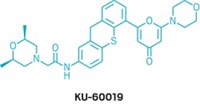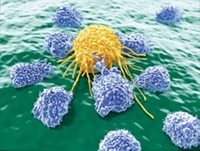Advertisement
Grab your lab coat. Let's get started
Welcome!
Welcome!
Create an account below to get 6 C&EN articles per month, receive newsletters and more - all free.
It seems this is your first time logging in online. Please enter the following information to continue.
As an ACS member you automatically get access to this site. All we need is few more details to create your reading experience.
Not you? Sign in with a different account.
Not you? Sign in with a different account.
ERROR 1
ERROR 1
ERROR 2
ERROR 2
ERROR 2
ERROR 2
ERROR 2
Password and Confirm password must match.
If you have an ACS member number, please enter it here so we can link this account to your membership. (optional)
ERROR 2
ACS values your privacy. By submitting your information, you are gaining access to C&EN and subscribing to our weekly newsletter. We use the information you provide to make your reading experience better, and we will never sell your data to third party members.
Drug Development
New Anticancer Target Identified
Drug Discovery: Cancer cells need MTH1 enzyme to thrive; inhibiting it kills them
by Stu Borman
April 4, 2014
| A version of this story appeared in
Volume 92, Issue 14
A novel strategy for fighting cancer with potentially minimal side effects could spark a new round of drug discovery efforts.
In two new papers, researchers confirm earlier hints that an enzyme called MTH1 is critical for cancer cell proliferation. They identified inhibitors of the enzyme and showed that the compounds suppress tumor growth in cancerous mice. In addition, they found that an anticancer agent of previously unknown mechanism works by inhibiting MTH1 and also identified another inhibitor with better drug properties.

Cancer cells produce new cells rapidly and thus require a constant supply of new DNA. But because cancer cells are interlopers that develop under stressful conditions in the body, bases produced in cancer cells for DNA replication tend to be damaged oxidatively much more frequently than those found in normal cells.
Cancer cells can withstand such damage because MTH1 protects them: The enzyme blocks these damaged bases from being incorporated into replicating DNA. It does the job so well that cancer cells thrive.
Thomas Helleday of the Karolinska Institute, in Stockholm, and coworkers have now validated MTH1 as an anticancer target and have treated cancer cells with TH287 and TH588, two MTH1 inhibitors they developed (Nature 2014, DOI: 10.1038/nature13181). The inhibitors block MTH1’s activity, allowing oxidatively damaged bases in the cancer cells to make their way into replicating DNA. The resulting DNA damage suppresses growth of human skin, colorectal, and breast tumors grafted into mice.
And Giulio Superti-Furga of CeMM, the Research Center for Molecular Medicine of the Austrian Academy of Sciences, Vienna, and coworkers found that SCH51344, an anticancer agent discovered earlier, works by targeting MTH1. They also identified another MTH1 inhibitor with better drug properties—(S)-Crizotinib, the enantiomer of an approved Pfizer non-small-cell lung cancer drug (Nature 2014, DOI: 10.1038/nature13194). (S)-crizotinib stifles tumor growth in a mouse model of colon cancer.
“The Helleday and Superti-Furga labs have done a stellar job of showing how MTH1 inhibition can effectively target a number of tumor cell lines,” comments MTH1 expert Priyamvada Rai of the University of Miami School of Medicine. She notes that a German group also recently identified a potent MTH1-specific inhibitor (Angew. Chem. Int. Ed. 2014, DOI: 10.1002/anie.201307849).
The studies represent “an exciting new approach” for targeting differences between tumor and normal cells, says Margherita Bignami of the National Institute of Health, in Rome, a specialist on oxidative stress in cancer. But she cautions that MTH1 also prevents mutations and senescence in normal cells and protects the brain, so inhibiting it could turn out to cause side effects.
Helleday acknowledges that further work is needed and that any clinical trials of MTH1 inhibitors are at least one to two years away.





Join the conversation
Contact the reporter
Submit a Letter to the Editor for publication
Engage with us on Twitter